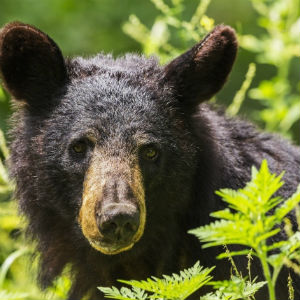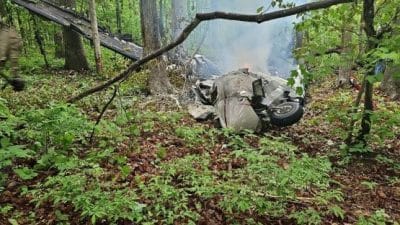
“Bears are doing damage in our peanut fields by digging them up,” shared Southampton County farmer M.L. Everett Jr. “They have the unique ability to find the best peanuts in the field, located in the best soil. Pawing them up, they eat the peanuts off the plants, leaving a bare pile of vines.”
Everett, who serves as chairman of the Virginia Farm Bureau Federation Peanut Advisory Committee, said last year bears destroyed 2½ acres of his peanuts. “They also tore into our 4 feet by 6 feet peanut bales that were baled for cattle feed, looking for a stray peanut that may be inside.”
He said they also have caused damage to corn fields. “Interesting enough, if they pull an armful (of corn) and an ear drops on the ground, they throw all the ears on the ground and start over again.”
Everett added that bears also damage cotton crops. He recalled seeing Facebook images of bears tearing plastic off round bales of cotton. “This is very serious as it takes a lot of time to clean up a busted cotton bale, which can weigh 8,000 pounds.”
Katie Martin, a wildlife biologist for the Virginia Department of Game and Inland Fisheries, said bears in the state are rapidly increasing and the population is now estimated at 18,000. The Virginia Wildlife Conflict Helpline received 2,348 calls about black bears—the most of any species—in fiscal year 2018.
Martin said bears are usually solitary, but females will stay with their cubs until they are about 15 months old. She added that they can move around a lot, but are typically shy animals and not aggressive.
“They will eat anything and if it is tied down, they will try to figure out how to get it.” Vegetative matter makes up 75 percent of their diet, including berries, nuts and fruit. The remainder of their diet consists of road kill, insects, fish and rodents.
“Unfortunately, there is not a one-size-fits-all solution for the damage farmers across the state are facing from bears,” said Stefanie Kitchen, VFBF assistant director of governmental relations. “Producers are encouraged to contact and work with DGIF on a strategy that works best for their particular situation.”
Anyone experiencing issues with bears or other wildlife can call the toll-free wildlife helpline at 855-571-9003.










